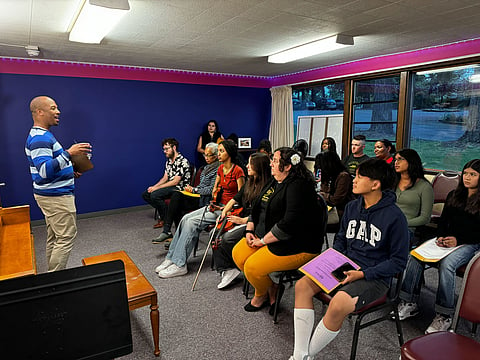Key to Change Opens New Location in Des Moines, Making Violin and Viola Lessons Even More Accessible
After seven years of teaching kids in South King County how to play the violin and viola, music organization Key to Change is expanding to Des Moines. This new opening marks an important period of growth for the program, which empowers teens across the South End to learn how to play classical music and prepare for college. And according to founder Dr. Quinton Morris, interest is booming.
“I have 15 or 17 leads of families who are all interested in lessons,” said the acclaimed violinist and Seattle University professor. ”It’s great because it means the formula is working — providing access and instruction for students who are traditionally marginalized and not welcomed into this art form … so I got good problems.”
A third of Key to Change students live in or near Des Moines and the nearly one-hour round trip drive to the organization’s Renton home base is simply too far for a lot of folks. Thus, Key to Change opted to come to the students and took over a spot right across the street from Mount Rainier High School. Because Key to Change gives lessons at below-market-rate value and specifically aims to uplift children from BIPOC and underserved communities, this new spot will make their programming even more accessible. For the past several months, organizers have been doing some light remodeling of the space ahead of its opening this month.
“My goal for this next year is to try to get as many kids enrolled and involved in our program as possible. And also — pardon me — teach my ass off,” said Morris. “I want to make caring, responsible, accountable young citizens and the next couple of months are going to be very crucial from a political standpoint. I think that organizations such as Key to Change have an opportunity to continue to really show students that regardless of who wins, you still have to show up and be prepared.”
Morris’ drive to start Key to Change came from a very personal place. After being introduced to the violin in third grade, he started seriously playing the instrument in ninth. “My violin teacher lived in Bothell, and I lived in the Renton Highlands. I used to have to take three buses in order to get to my violin lesson each week,” said Morris. “You can imagine at the age of 15 how taxing that was.” The organization aims to remedy that exact problem.
When he started Key to Change in 2017, there were no programs dedicated to high-level violin and viola instruction that specifically served students in South King County and prepared them for the responsibilities of adulthood. And Key to Change is just that — giving children and teens the keys to change their own lives.
“That’s why we practice — so that we can express who we really are on the inside,” said Morris. “We take a more holistic approach of not just saying, ‘You need to practice for 30 minutes,’ but more of ‘We practice because we want to present our best selves to one another, and we’re not ashamed of who we are or how we sound because we are joyful, amazing people.’”
In the years since it began, Key to Change students and alums have soared to great heights. Many students have played pieces with the Seattle Symphony and, more recently, performed for Vice President and presidential candidate Kamala Harris during one of her appearances in Washington. However for Morris, his goal isn’t to turn kids into internationally acclaimed professional musicians (though that’s always nice), rather, it’s to give them tools to pursue higher education and express themselves.
“Our job here, through the violin, is to teach kids how to move forward. And because there’s not a lot of Black and Brown kids who are playing at a professional level [and] getting a lot of opportunities, our job is to make sure that when they play, they sound good,” said Morris.
He continues: “When they’re prepared, doors open, and the doors that open are generally much bigger, the opportunities are bigger and exceed their expectations of what they ever could have imagined that they would be. That’s what the violin does. It’s the high society instrument, right? If you can play that thing well, couple it with good grades, and you don’t lose your sense of self and you’re responsible and you’re accountable — you win.”
For more information about Key to Change, check out its website.
Jas Keimig is a writer and critic based in Seattle. They previously worked on staff at The Stranger, covering visual art, film, music, and stickers. Their work has also appeared in Crosscut, South Seattle Emerald, i-D, Netflix, and The Ticket. They also co-write Unstreamable for Scarecrow Video, a column and screening series highlighting films you can’t find on streaming services. They won a game show once.
Help keep BIPOC-led, community-powered journalism free — become a Rainmaker today.


